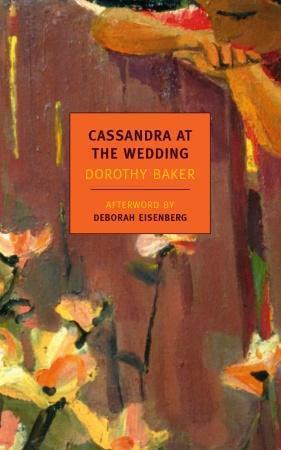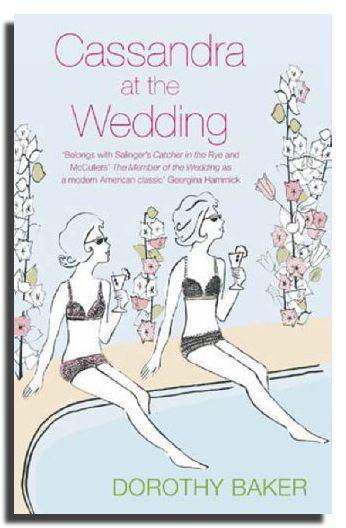Cassandra at the Wedding, by Dorothy Baker
Cassandra and her identical twin sister, Judith, have been inseparable all their lives. Cassandra thought they always would be, but nine months ago Judith went to New York for a year leaving her behind.
Cassandra expected Judith to return and for them to build their lives together, sisters against the world. Instead Judith has announced she’s getting married to some doctor she met out East, and Cassandra’s been invited to the wedding.
And I knew right now … why I’d been asked to the wedding. I’d been asked because I could stop it in time, I could stage a last-minute rescue.

Cassandra and Judith grew up on a California ranch. Their family was close-knit: their father, a retired and politely drunk professor of philosophy, raised them using the Socratic method, treating his children as if they were adoring students; their mother, a famous writer, died a few years back but helped instill in them a sense of their own intellectual merit; their grandmother is a kind and loving woman but with a distinct preference for maintaining propriety rather than for seeing uncomfortable truths. As a family they were rich, artistic, elitist and above all self-contained (“we had our own pinnacle to look down from”).
When Cassandra and Judith left home, they left home together. They got an apartment in Berkeley, and because Judith was musical Cassandra bought a high-end piano for them to share. For Cassandra the piano is a symbol of the sisters, of their indivisibility.
I only listened and knew how good she was and what a piano we had, and later that night when she quit playing and came out onto the deck where I was looking at the lights and listening, she said, “We ought to live this way, don’t you think?” It was as if I’d been waiting all my life to hear her say it, and I said yes, oh yes, how could we imagine it ever being any other way? Let’s never get stuck with outsiders, just be ourselves and keep it honest, now we’ve got this piano.
When Judith moves to New York that’s bad, but marriage is much worse. The piano is beautiful, but cut in half it would be ruined. The parallel is obvious.
The book opens with Cassandra driving to the wedding. It’s first person voice, and immediately that voice is a troubled one. In a marvellously hardboiled line (so fitting for a book set in California) Cassandra glances at the Golden Gate bridge, noting that it looks good again. She means it looks tempting, like an exit.
En route she stops at a bar, drinks more than she should, and looks at her reflection. I have a pet hate of characters looking in mirrors and describing themselves, but here it works because of course Cassandra has spent her entire life looking at herself mirrored in Judith. Without Judith as contrast and support, Cassandra’s own identity starts to unravel.
my face in a blue mirror between two shelves of bottles. The bottles looked familiar enough, but I didn’t immediately recognize the face, mostly, I think, because I didn’t want to. It’s a face that’s given me a lot of trouble.
As Cassandra drives along you quickly get a sense of her: intelligent; brittle; impulsive; self-destructive. She sees a pumphouse spraying out water in the desert heat, stops, climbs a ladder to it and dunks her head straight into the jet to refresh herself; she wants to phone ahead to let the family know she’s arriving early, so calls from a phonebooth intended only to be used for emergencies. She drives with the top down on her car, the resulting sunburn leaving her uncomfortable in her own skin literally as well as figuratively. She’s fearless, except for her fear of living.
Judith later drives down the same road with her fiancé by her side, in a section of the book narrated by her. They don’t stop for a drink. They drive responsibly.
We were passing a pumphouse with a long pipe sticking out of it and throwing a beautiful head of white water into a cement weir. I wished I could put my head into it, but I laid it on Jack’s shoulder instead and thought about the door we’d open not so long from now.
…
“How would it be to phone ahead?” I said. “There’s an emergency telephone booth along here somewhere.” “This isn’t an emergency,” Jack said.
A book like this lives and dies by its characters. Cassandra’s narrative voice is intense, almost overwhelming, but also wry and observant of everything except the things she doesn’t want to see. Judith’s only emerges when Cassandra’s is briefly silenced. Judith is sensible, practical, normal. Cassandra, who it slowly emerges is gay, doesn’t even have the option of being normal (the book was published in 1962 – even without Cassandra’s emotional issues it’s not a period where a gay woman could aspire to a life of suburban married contentment).
Cassandra is writing a thesis she can’t finish, staying cocooned in the academic world she learned from her father. Her relationships are brief encounters only, nothing with even a hint of a future. In a sense she’s insisting on living forever as she did as a child, her and Judith sufficient and separate and aloof. Judith though, Judith doesn’t want to be separate and aloof. She wants to marry, to have a nice house, to settle down. This quote is from Cassandra’s section:
“You told me so many things,” I said. She waited a minute, looking back over her shoulder toward the pool; then she looked down at me, and said very quietly, “No, I don’t think I really told you anything. It was all you, you did the talking, you made all the plans, and I, I don’t know, but I think I got sort of drowned in it, or snowed under. When you hit your stride you’re—” “I’m what. Tell me. I absolutely have to know what I am when I hit my stride.” “You’re overwhelming. It’s some sort of crazy vitality and it goes out like rays. I’d forgotten what it’s like to be with you—kind of a circus. Only—”
A lesser novelist would have made Jack, Judith’s fiancé, unsympathetic. In fact though he and Judith are a good match and he’s a definite catch. He’s a handsome young doctor, friendly and polite, and he loves Judith as much as she loves him. He’s exasperated by Cassandra, but more because he sees her as self-indulgent than anything else. Where Cassandra talks about wanting to die, Jack replies “Quit talking about wanting to die,” … “Dying is a big thing.” Jack offers Judith an equal union, not a perpetual role as Cassandra’s ballast.
Dorothy Baker was a playwright as well as an author, and it shows here. Cassandra at the Wedding is in essence a three-part play (Cassandra’s section, Judith’s section, Cassandra’s second section). It almost all takes place in the same location, there’s only a handful of characters, and it features that classic dramatic motif of a family reunion leading to personal revelations and conflicts.
If this were a play, it would be an excellent one. It has sharply written characters and dialogue, cleanly delineated scenes and no fat. It’s packed with great little exchanges and observations (mostly Cassandra’s, Judith’s nicer and not looking from the outside):
“There’s probably a school for wives,” I said, “but you don’t need to go.” I felt better, and I looked at her obliquely to see if she felt worse, but there was no sure way to tell.
…
I don’t like things rumpled up. If there is tissue paper all over everywhere I shove it under the bed. I have ideas of order.
…
His hair was so clean that each single hair had its own halo.
…
He’d never known his mother, and his father died when he was twelve. No home life at all, which is probably why he turned out so well.
…
The heat hung in wavy layers above the road and made it look like water.
I could keep quoting, but I’ve done so too much already. I’ll wrap up then by just saying that this is a perfect example of exactly why I and so many others regard NYRB Classics as a go-to publisher for quality work.
On a final note, while the NYRB Classics edition is the one I read, while looking for a picture of the cover to add to this post I came across the alternative cover below. It’s just about the most misleading thing I’ve seen in ages.

If you bought Cassandra at the Wedding hoping for a light pastel beach read about twins’ comic misadventures around a wedding, well, I think you’d be entitled to feel a little misled.
Other reviews
The review that persuaded me to read this was Jacqui’s at JacquiWine’s Journal, here. There’s also a great review at 1streading’sblog here, which went up back when I was still reading the book myself. Please feel free to link to others in the comments.
Filed under: Baker, Dorothy, US Literature Tagged: Dorothy Baker

